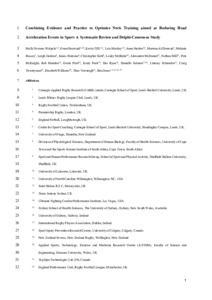FOWNES-WALPOLE, Molly, HEYWARD, Omar, TILL, Kevin, MACKAY, Lois, STODTER, Anna, AL-DAWOUD, Marwan, BUSSEY, Melanie Dawn, GORDON, Leigh, HAIRSINE, James, KIRK, Chris, MADDEN, Rob, MCBRIDE, Lesley, MCDANIEL, Alexander, MCKNIGHT, Pete, MILL, Nathan, PEEK, Kerry, PRATT, Gavin, RYAN, Des, SALMON, Danielle, SCHROEDER, Lindsey, TWENTYMAN, Craig, VERSTEEGH, Theo, WILLIAMS, Elisabeth and JONES, Ben
(2025).
Combining evidence and practice to optimise neck training aimed at reducing head acceleration events in sport: a systematic review and Delphi-consensus study.
British Journal of Sports Medicine.
[Article]
Documents
35723:934504
![[thumbnail of Fownes-Walpole et al 2025 Neck strength Delphi ACCEPTED.pdf]](https://shura.shu.ac.uk/35723/1.hassmallThumbnailVersion/Fownes-Walpole%20et%20al%202025%20Neck%20strength%20Delphi%20ACCEPTED.pdf)

Preview
Abstract
Head acceleration events (HAEs) can potentially have adverse consequences for athlete brain health. In sports, in which head injuries have the highest incidence, identifying strategies to reduce HAE frequency and magnitude is a priority. Neck training is a potential strategy to mitigate against the magnitude of HAEs. This two-part study aimed to (1) systematically review the literature of neck training interventions in sport and (2) undertake an expert Delphi consensus on the best practices for neck training implementation to reduce HAEs in sport. Part I: a systematic search of four databases was undertaken from the earliest records to September 2024. The PRISMA (Preferred Reporting Items for Systematic Review and Meta-Analysis) guidelines were followed, and a quality assessment was completed using a modified Downs and Black assessment tool and the GRADE (Grading of Recommendations Assessment, Development and Evaluation). Papers were eligible if they both (1) implemented a reproducible exercise intervention targeting the neck within collision, combat or motor sport, and (2) assessed outcomes relating to either: the physical profile of the neck; head/neck injury incidence; and/or HAEs. Part II: 18 international experts, with experience in research and/or applied practice of neck exercise training, concussion and/or HAEs, reviewed the part I findings before completing a three-round Delphi consensus process. Part I included 21 papers, highlighting the heterogeneity of existing interventions. Part II resulted in 57 statements coded into five categories: contextual factors (n=17), neck training periodisation (n=12), training adaptations (n=10), neck training content (n=15) and athlete adherence (n=3). This study presents recommendations for neck exercise training aiming to reduce HAEs in sport, supporting both practice and future research.
Actions (login required)
 |
View Item |



 Tools
Tools Tools
Tools